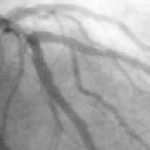1. In this randomized controlled trial, among patients presenting with stable chest pain and an intermediate pre-test probability for obstructive coronary artery disease (CAD), there was no significant difference between men and women who received initial coronary computed tomography (CT) and coronary angiography with respect to major adverse cardiovascular events (MACEs).
2. Women receiving coronary CT as an initial diagnostic test had a lower rate of major procedure-related complications than women receiving coronary angiography as an initial diagnostic test.
Evidence Rating Level: 1 (Excellent)
The incidence of coronary artery disease (CAD) is similarly high in both men and women, and accounts for a high proportion of all-cause death. However, previous evidence has shown that women with stable chest pain and suspected CAD have more severe symptoms but less severe myocardial ischemia and epicardial coronary artery disease when compared to men. However, knowledge of this phenomenon may lead to misdiagnosis and poorer outcomes in women. With respect to diagnosis, while coronary angiography is the gold standard for clinical diagnosis of CAD, coronary computed tomography (CT) has been shown to be clinically useful for the diagnosis of obstructive CAD in patients presenting with stable chest pain and an intermediate pre-test probability. However, coronary CT has been reported to have a comparable or slightly lower accuracy in women than in men, but there is a paucity of high-quality evidence comparing the gender-specific effectiveness of coronary CT and invasive coronary angiography as the initial test. The diagnostic imaging strategies for patients with stable chest pain and intermediate risk of coronary artery disease (DISCHARGE) trial previously showed no difference between an initial coronary CT and initial coronary angiography with regards to major adverse cardiovascular events (MACE), but the aim of this analysis was to assess the gender-specific comparative effectiveness of coronary CT and coronary angiography. The DISCHARGE trial was a prospective randomized controlled trial, including 26 clinical centers in 16 European countries. Included were patients at least 30 years of age, referred for further investigation due to stable chest pain and intermediate pre-test probability of obstructive CAD. Between October 2015 and April 2019, 3,541 patients, 2002 women (57%) and 1559 men (43%), were included in the analysis. With respect to the primary outcome, there was no significant difference in major adverse cardiac events (MACE) between men and women (HR 1.58, 95% CI [0.68, 3.66]; P=0.29), even after further stratification of these events. With respect to secondary outcomes, between men and women, there was no significant interaction between gender and study group for major procedure-related complications (HR 0.28, 95% CI [0.06, 1.33]; P=0.11). However, within gender, the risk of a major procedure-related complication was lower in the coronary CT group than in the coronary angiography group in women (HR 0.14, 95% CI [0.04, 0.46]), but this same correlation was not seen in men. Overall, this post-hoc analysis of the DISCHARGE trial suggests that in patients with stable chest pain and intermediate pre-test probability of obstructive CAD, there is no significant difference in MACEs; though there was a higher risk for procedure-related complications in women receiving coronary angiographies when compared to coronary CTs as the initial intervention. A limitation of this study is that patients were categorized according to gender, and thus the extent of heterogeneity within each gender group with regard to sex is not known. This analysis is an important addition to current evidence studying the differences in the efficacy of diagnostic tests between men and women, as this knowledge allows for more personalized healthcare.
Image: PD
©2022 2 Minute Medicine, Inc. All rights reserved. No works may be reproduced without expressed written consent from 2 Minute Medicine, Inc. Inquire about licensing here. No article should be construed as medical advice and is not intended as such by the authors or by 2 Minute Medicine, Inc.


